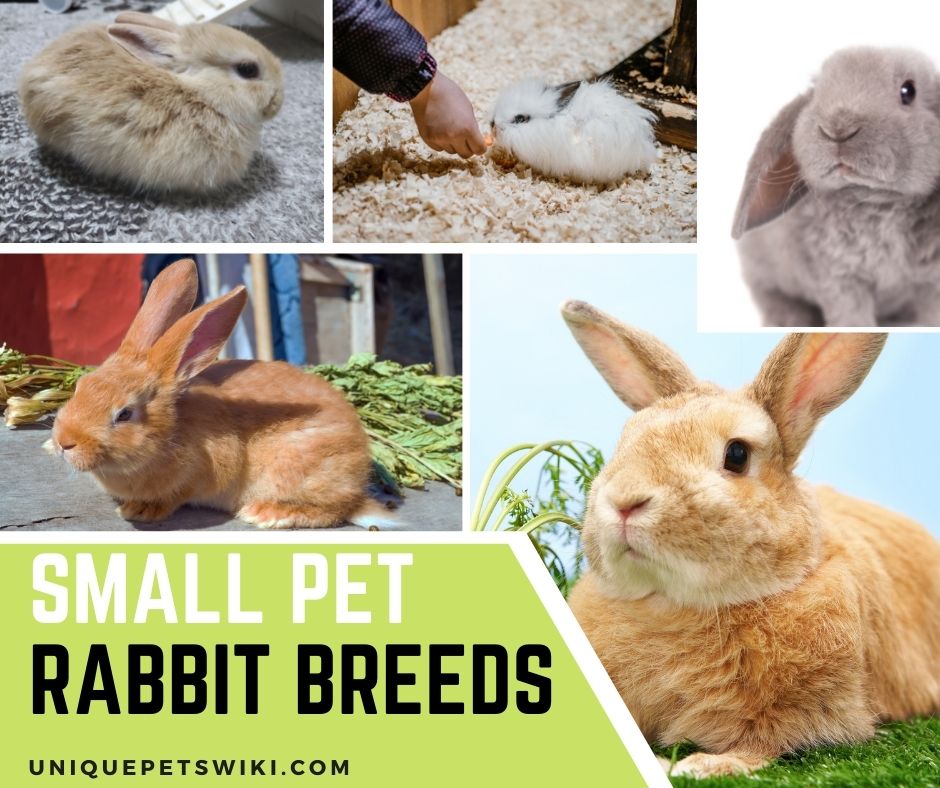Did you know that there are many different kinds of small pet rabbit breeds? Some breeds grow to be as big as a cat, while others stay small. Whether they’re on the large or small side, all rabbits need plenty of attention and care just like any other pet.
If you’re considering getting a rabbit for yourself or your family, here’s a list of fifteen of the most popular small breeds. These little bunnies can make great companions if given time and love. Read on to further your choices and save your research time and money.
Contents
What Are Small Pet Rabbit Breeds?
Rabbits make great pets for many reasons. They are small, easy to care for, and can be litter box trained like a cat. However, not all rabbits are created equal. Some breeds of rabbit will grow much smaller than others.
It’s hard to believe that some rabbits are as small and cuddly as your favorite pet, yet it is true! Pygmy rabbit breeds can be 8 inches long with a weight of less than one pound. Larger species grow up to 20 inches or 50 centimeters in length but still maintain an average body weight more than ten pounds.
Here are 15 of the smallest breeds:
- Netherland Dwarf
- Dwarf Hotot
- Jersey Wooly
- Lionhead Rabbit
- American Fuzzy Lop
- Holland Lop
- Mini Plush Lop
- Columbia Basin Pygmy
- Britannia Petite
- Polish
- Himalayan Rabbits
- Dutch Rabbits
- Havana
- Mini Rex
- Mini Satin
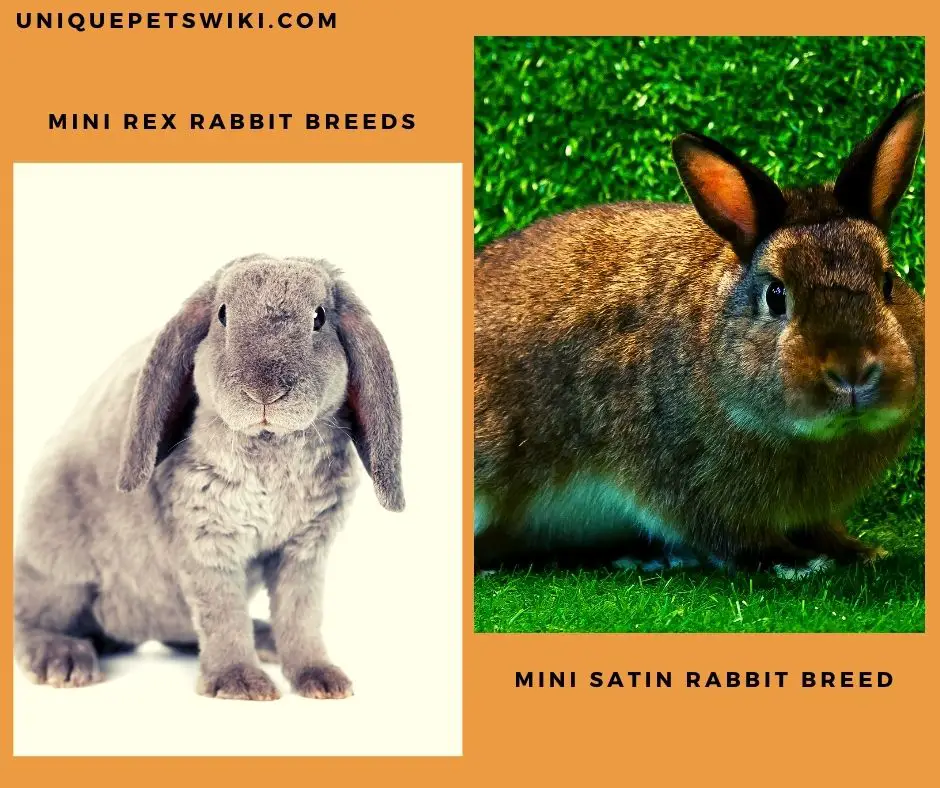
Rabbits can inherit one gene copy for size from each of their parents. For example, a rabbit with one dwarf gene and one normal sized parent will have all the characteristics of being dwarf in size while if they had two normal sized genes but no dwarfism then it would be known as false dwarfism.
TOP 15 Small Rabbit Breeds That You Can Keep as Pets
Small pet rabbits are known for being energetic little creatures full of life and personality. If you have decided that you would like to get one as a pet, then this article is for you. Read on below to find out which breed might be best for your family’s lifestyle.
| Small Rabbit Breeds | Size (smallest to larger) | Appearance | Cost(around) |
| Netherland Dwarf | Weight: 2 to 2.5 pounds, body length: 7.5 – 9 inches | Compact body, large head with short ears and large eyes | $30 – $90 |
| Dwarf Hotot | Up to 3 pounds | Markings around eyes and short, erect ears | $50 |
| Jersey Wooly | 2.5 – 3.5 pounds | Semi-arched with a bold head and a pair of small, erect ears, shaggy coat | $20 – $50 |
| Lionhead Rabbit | 3.75 Pounds | Maned neck with fur | $50 – $100 |
| American Fuzzy Lop | 3 – 4 pounds | Thick and short bodies with broad chest, short shoulders and round hindquarters, ears flop to the sides of their heads | $25 |
| Holland Lop | 2 – 4 pounds | Stocky look, short and thick legs | $40 |
| Mini Plush Lop | 3 – 4.5 pounds | Short, compact, thickset, cobby, well-muscled body | $325 – $450 |
| Columbia Basin Pygmy | Length: 9.3 – 11.6 inches; weight: up to 1 pound | grayish brown color with different shades | $30 – $90 |
| Britannia Petite | up to 2.5 pounds | Full-arched body with wedge-shaped faces and large, bulging eyes and small ears | $10 |
| Polish | 2.5 – 3.5 pounds | Short heads with full cheeks and bold eyes | $50 |
| Himalayan Rabbits | 2.5 – 4.5 pounds | White color with long and lean body with ears, noses, tails and feet colored in darker shades | $25 – $60 |
| Dutch Rabbits | 4 – 6 pounds | Grey, black and chocolate colors with white markings on its face, its feet, around its neck, and over its shoulders | $30 – $90 |
| Havana | 4.5 – 6.5 pounds | Rounded back with luxurious fur in rich chocolate color | $20 – 100 |
| Mini Rex | 3.5 – 4 pounds | Rounded back with short neck, short and straight legs and thick, short and upright ears | $20 – $100 |
| Mini Satin | Length: 3 – 4 inches; weight: 3 – 5 pounds | small, compact body with very shiny fur. | $50 |
Netherland Dwarf
Netherland dwarfs are shy and skittish but generally friendly. They need an open space and regular exercise. They are also highly susceptible to malocclusion which is a problem with the alignment of the jaw and teeth.
This breed of rabbit is extremely small. They only weigh between 1.1 and 2.5 lbs). Despite their small size, they need plenty of space to run for exercise. They are also more suitable to a quiet environment than one with children running around.
They normally live about 10 to 12 years. They also make great pets for adults and good companions for adults with disabilities. However, they are not the best pet breed for homes with children.
Dwarf Hotot
Dwarf Hotots are generally curious, alert and vigorous. However, with their amount of innate energy, they only need a quarter cup of pellets a day. They are also highly susceptible to malocclusion.
Dwarf Hotots have compact bodies. Their weight is usually no more than 3 lbs. They have markings around their eyes; hence, their nickname “the eyes of the fancy.” Their ears are short and erect.
This surprising little bunny’s temperament varies from outgoing to moody but they’re always friendly toward humans; this makes them an ideal candidate if you want something that won’t take up too much floor space in your home or living quarters. Their lifespan is about 7 to 10 years.
Jersey Wooly
Jersey Wooly rabbits are friendly and submissive by nature. This makes them extremely popular as house pets.
The weight of a full grown Jersey Wooly is about 2.5 to 3.5 lbs. Their body is small-sized and compact. Their body is semi-arched with a bold head and a pair of small, erect ears that are about 2 to 3 inches long. The coat is shaggy so it needs to be brushed at least once a week or more especially during shedding season.
These rabbits are prone to suffer from epilepsy and hereditary and congenital conditions. They live for about 7 – 10+ years.
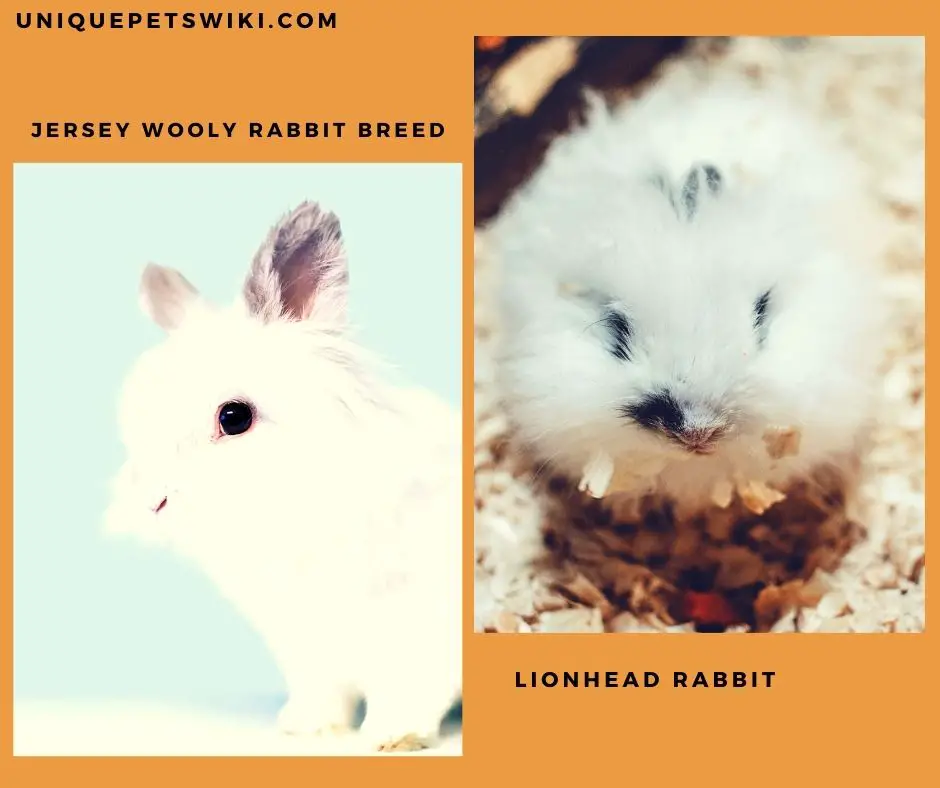
Lionhead Rabbit
Lionhead Rabbits can make an adorable pet with their interactive personality and good nature. They are generally smart and playful but can also be easily frightened. Despite their active personality, they need a quiet and stress-free environment.
Lionhead rabbits can grow up to 3 pounds and 8-10 inches long. They are only prone to certain illnesses and conditions. They live about 7 to 9 years.
American Fuzzy Lop
American Fuzzy Lops are active and playful. They are sweet and energetic pets that have been known to be great for show and fur purposes. Their coat needs to be brushed every few days as they are prone to Wool Block.
A fully grown American Fuzzy Lop rabbit weighs about 3 to 4 lbs. It has a thick and short body with broad chest, short shoulder and round hindquarter. Its ears flop to the sides of their heads. These rabbits live about 5 to 8 years.
Holland Lop
Cute, cuddly and full of personality, the Holland lop rabbit is one to swoon over. Their floppy ears make them even more adorable. You’ll want everyone who enters your home to know about their affectionate disposition.
Despite their generally calm, gentle, and docile temperament, they need plenty of time to hop and exercise outside their cage.
Miniature rabbits called Holland Lops only weigh about 2 to 4 pounds. They are prone to suffer from epilepsy and hereditary and congenital conditions. Their lifespan is only about 7 to 10 years.
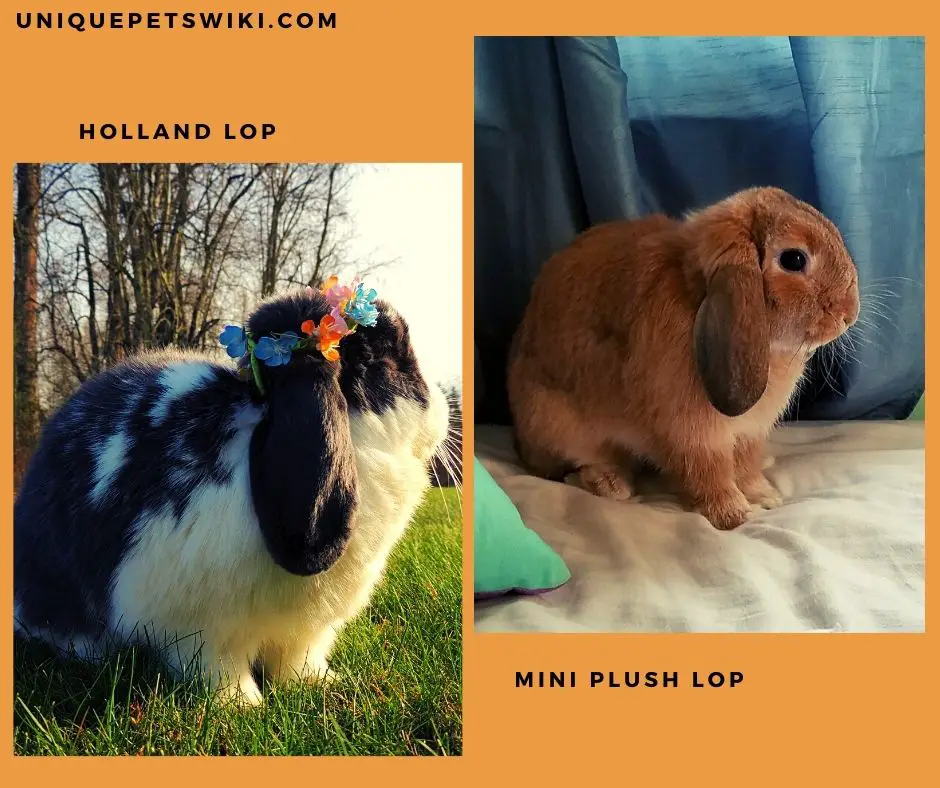
Mini Plush Lop
Mini Plush Lops have a sweet, gentle and docile personality. They are an ideal children’s pet because they are small, and easy to take care of. Its size of 3-4.5 lbs also makes it inexpensive to feed. They only need a grass-based food diet.
Despite this kind of diet, they are still prone to develop dental problems and only live about 7 to 14 years.
Columbia Basin Pygmy
The Columbia Basin Pygmy rabbits are known for being the smallest in North America. Adults can only grow up between 9.3-11.6 inches long with an average weight of less than 1 pound.
Their temperament is generally excitable and nervous. Their breed has already fallen to endangerment in some areas due its rarity and threatened status internationally. They need to be taken care of by experts, scientists, and professionals.
The lifespan of pygmy rabbits is about 3 to 5 years.
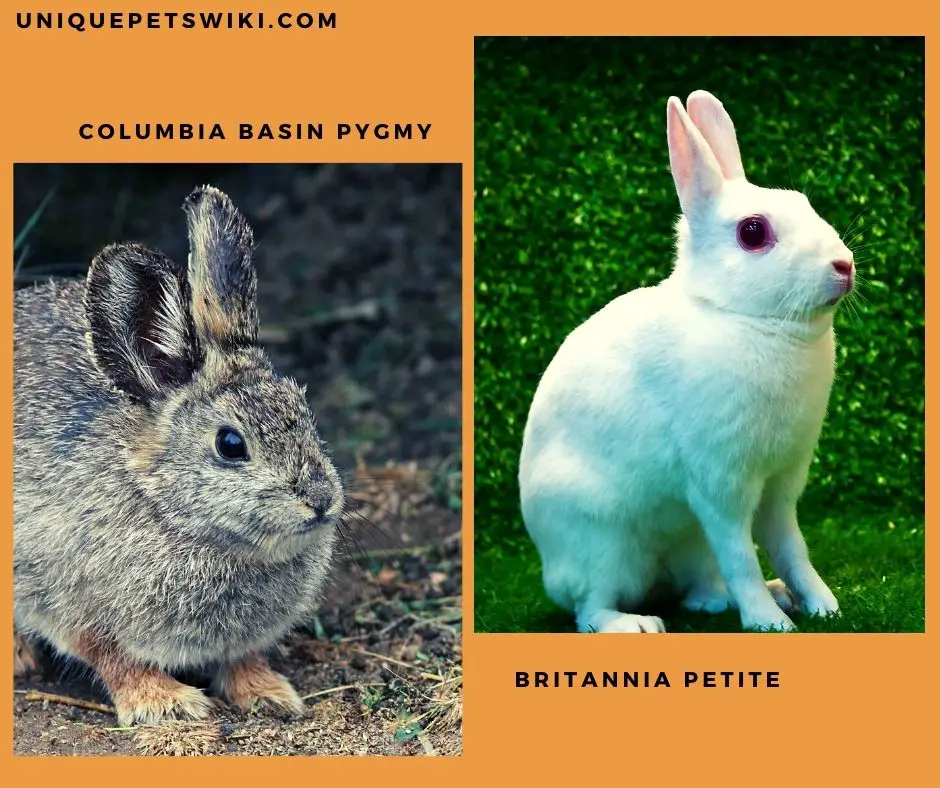
Britannia Petite
Britannia Petite is dwarf-sized and can only weigh up to 2.5 lbs. It has a full-arched body type. Their faces are wedge in shape with large, bulging eyes. They have small ears that touch from their head base to near their tips.
They are generally active and energetic. Due to this personality, they need to have an indoor enclosure with plenty of space. They are prone to developing overgrown teeth and have a lifespan of about 6 to 10 years.
Polish
The Polish rabbit is a small breed that weighs about 2.5 to 3.5 lbs. It has a short head that comes with full cheeks and bold eyes.
Polish rabbits are calm, curious, intelligent and playful by nature. These breeds have low care needs and do not require much room – they’ll happily live inside your home in an apartment if you give them enough love and attention. They are unable to withstand high temperatures.
They are prone to hairball obstructions and matted coastal. They live about 5 to 6 years.
Himalayan Rabbits
The Himalayan rabbit is a calm and good-natured breed of pet. This friendly animal likes to interact with their owners and spend time outside its cage especially for playtime. Their diet is usually hay-based.
Himalayans are small-sized and typically weigh about 2.5 to 4.5 lbs. They are long and lean in shape. They come in white color with ears, noses, tails and feet colored in darker shades.
This breed is prone to ear mites, flystrike, and overgrown teeth. They live about 7 to 10 years.
Dutch Rabbits
Calm, energetic and sociable are the general characteristics of dutch rabbits. This requires them to have a clean and calm environment.
A dutch rabbit is small to medium in size and weighs about 2 to 2.5 kg when fully grown. It has white markings on its face, its feet, around its neck, and over its shoulders. Its body comes in another color such as grey, black and chocolate.
They are prone to hereditary and congenital conditions such as epilepsy. They live about 6 to 9 years.
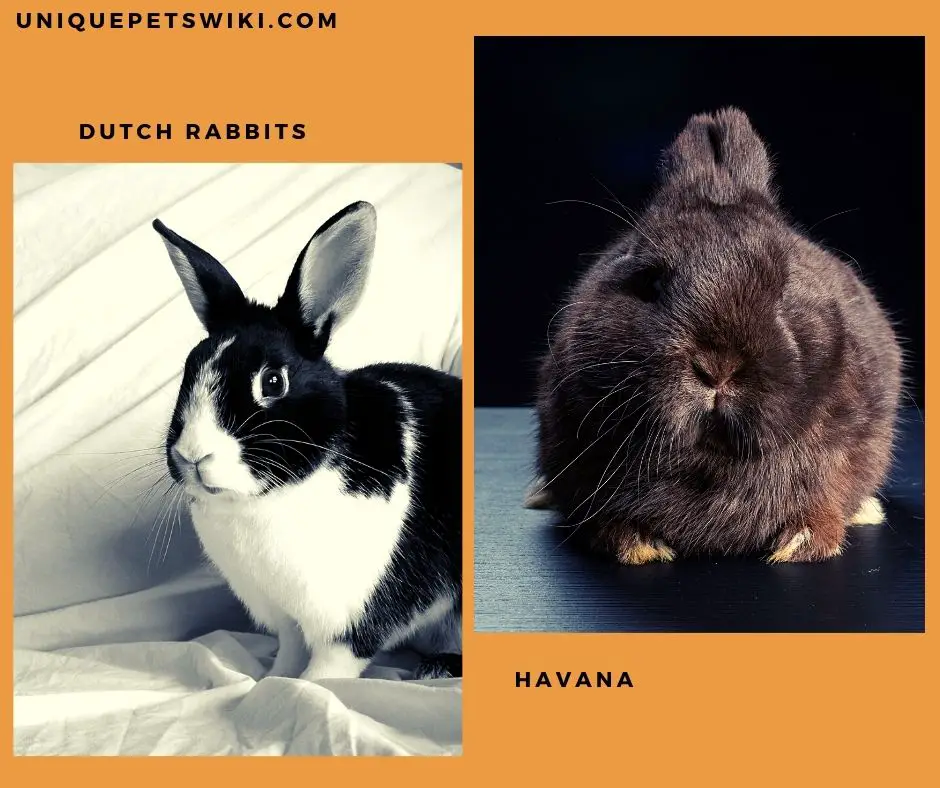
Havana
Havana rabbits are sweet tempered, affectionate and calm. They bond easily to their human families making them a great pet for those who want an indoorsy bunny or out on the go!
Havana bunnies aren’t overly energetic so too much running around won’t wear this little bunny down but they will enjoy interaction with its owner by playing games. This requires them to have a sturdy and roomy cage.
The Havana rabbit has a compact body that weighs about 4.5 to 6.5 lbs. It has a rounded back and comes with luxurious fur in rich chocolate color. They are prone to developing ingrown teeth and have a lifespan of 7 to 12 years.
Mini Rex
The Mini Rex rabbit is a small, low maintenance breed of pet. Not only does it have the friendly personality that people love but this type also comes in an array colors. Many even consider them to be one if not the best show rabbits out there today.
Their docile, sweet, friendly, and calm personality requires them to have a cage that is close to their human families.
A mature Mini Rex weighs about 3.5 to 4 lbs. Its body is proportioned with its shoulders and hindquarters. It has a pair of thick, short and upright ears that sit close together on its head. It comes with a rounded back, short neck and short straight legs.
They are susceptible to malocclusion, GI stasis, respiratory disease, mites, and uterine cancer and live about 7 to 8 years.
Mini Satin
The Mini Satin rabbits are short, well rounded and have a full head with ears that are 3.5 inches long. This little bunny can weigh anywhere between 3-4 pounds when fully grown.
This lovable, cuddly bunny is a great pet for anyone. They make excellent companions and can be playful with children. Their small size makes them easy to take care of in an apartment setting as well; they don’t need much room at all.
They need to have their habitat disinfected once a week as they are prone to mites, flystrike and overgrown teeth. They live about 5 to 8 years.
What Are The Advantages of Having A Small Pet Rabbits Breed?
The advantages of having small pet rabbit breeds include that these bunnies do not require too much space unlike dogs or cats making it easier to accommodate them. If you are one of those who love pets but does not want any large animal then small rabbits can be an excellent alternative due to the following reasons:
Easier To Maintain
The most significant advantage of having small pet rabbit breeds is that they are easier to maintain than cats or dogs. When it comes to taking care of them, you just need the right food and a place for them to live.
You could bring these bunnies anywhere you go because they could easily fit in a bag or any other kind of container making it easy for transporting from one place to another.
No Special Training Required
Small rabbits are easy to train. If you properly train these bunnies while they are young, it would be extremely easy for them to adjust in any environment though one thing you should know about rabbits is that they never respond well if subjected to shouting or beating because they easily get scared.
One way of training these bunnies is by using treats as a reward for good behavior and a place to relieve themselves.
Minimal Allergic Reactions
When it comes to allergies, the advantage of having small pet rabbit breeds is that they produce minimal quantities of allergens making them an excellent choice for pet lovers. The fur of these bunnies is the only source of allergens which is why they are not recommended for those who have allergies.
Cheaper In The Long Run
One of the best advantages of having small rabbits is that they are cheaper in the long run compared to other pets. In fact, you could spend around $20 a month on their food and water supply.
No Need For Frequent Grooming
One more advantage of having small rabbits is that they do not require special routine care since they often keep themselves clean. The only thing you need to do is to brush them thoroughly at least twice a week and trim their nails every once in a while.
The only thing you should beware of is that if your rabbit breed has long fur, you would need to brush them more often.
No Restrictions When It Comes To Owning One
The majority of countries do not have any limitations regarding the number of rabbits you are allowed to own, making them an excellent option for small families who want a pet.
No Noise Disturbances
The advantage of having small pet rabbit breeds is that they make almost no noise at all. The only time they would be noisy is when they are screeching because of fear and pain.
Healthy And Active Lifestyle
The advantage of having small pet rabbit breeds is that they require an active lifestyle which means that they are not the type of pets you should lock up in a room or in a cage for most of the day. The best thing you can do is to have them play outside especially during summer time where they could freely roam around your lawn.
The same rule applies even when they are indoors. You just need to know that it is okay for bunnies to hop from one place to another and you should provide them with a space where they can do that. The more active their lifestyle, the better for their overall health.
Notes When Getting a Small Pet Rabbit
Small rabbits are very common pets. A small rabbit (full grown) is about the size of a guinea pig, and they make for very good pets. If you get a small pet rabbit, there are several things that you should keep in mind.
First of all, their cages must be enough to fit them comfortably; if not, this will cause some health problems. The minimum cage size requirement for a single rabbit is three times the height of the rabbit in length , two times the height of the rabbit in width , and one and a half times the height of the rabbit in depth.
Second of all, their food must be fresh . It’s very important to not let the rabbit go hungry because it will quickly become unhealthy. Usually, pellets are recommended for small rabbits; however, if they refuse to eat them or if there are some other health problems (such as urinary tract infections), vegetables can be given instead.
The third and final thing to keep in mind is that the rabbit must be handled regularly, so that it gets used to being picked up. If not, the rabbit will get stressed out if it’s picked up.
When you start picking up your small rabbit for the first time, hold them close to your face and let them sniff you before picking them up under their front legs and supporting their hind legs with your hands.
By keeping these three things in mind during your pet’s life, you should have a healthy and happy small rabbit.
Wrapping Up
We hope you enjoyed our list of the top 15 small pet rabbit breeds for pets. There are many different types of rabbits that make great companions and we encourage everyone who wants one as a pet to find out which breed would be best suited for their home first.
With so much love and care, even those considered “small” can grow up into large animals in time.
